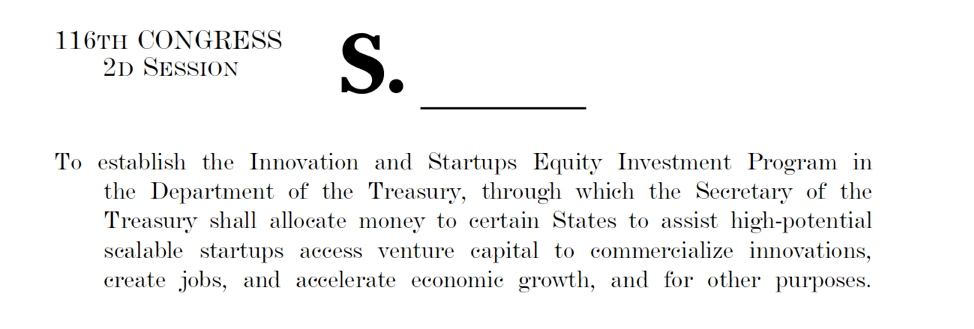On March 19, 2020, a bill proposing the New Business Preservation Act was submitted to the Senate that seeks to drive economic activity, innovation, and job growth in the wake of the COVID-19 pandemic and the economic downturn. The New Business Preservation Act will provide equity funding for new businesses, with larger allocations directed to areas lacking in capital including the Midwest.
While the bill was important even earlier, the events of recent weeks add urgency. Dollar for dollar, it represents possibly the most effective grassroots economic stimulus for the mid-to-long term (2-10 years). Even for the immediate months ahead, it can stem job losses among venture-based businesses.
As an early-stage venture fund based in the Midwest, Great North Labs believes this legislation will drive startup activity and value creation in the undercapitalized regions of our country. Entrepreneurship is a proven, capital-efficient way to build economic value and transform regions, and adding capital to our under-capitalized region will bolster existing entrepreneurial ventures and encourage new ones.
Our support of this legislation is apolitical. As investors, we see the success of this approach every day. Around the world, venture capitalists who pick talent, invest in portfolio companies, and work with their ecosystem (including government) enable grassroots wealth creation. Better than any stimulus or wealth transfer mechanism, the most powerful and durable antidote to economic inequality is new value creation. It is not the CCC or WPA creating jobs for the sake of paying people, or the government distributing wealth, this is grassroots economic growth driven by venture capital. It is not a one-time distribution. It does not depend on daily oscillations of the stock market which cannot possibly reflect true changes in economic value. Rather, it drives true economic value creation through innovation.
“Senator Klobuchar’s bill is a positive step at a critical time. As we look at how to cope with the challenges presented by the coronavirus, we should not lose sight of the critical role new businesses play in creating jobs. The New Business Preservation Act will help level the playing field, by backing entrepreneurs in every state and every zip code, and lead to a more inclusive economy.”
-Steve Case, Chairman and CEO of Revolution (Revolution operates the Rise of the Rest Seed Fund focused on investing in areas outside of traditional VC hubs.)
The Bill
The bill was sponsored by Sen. Amy Klobuchar, and co-sponsored by Sen. Chris Coons, Sen. Angus King, and Sen. Tim Kaine. It seeks to create an Innovation and Startups Equity Investment Program (ISEI) within the Department of the Treasury. The Program will “allocate money to certain States to assist high-potential scalable startups access venture capital to commercialize innovations, create jobs, and accelerate economic growth, and for other purposes.”

The legislation calls for $2B to go to the ISEI, with $1.5B going to initial funding and administrative costs, and a further $500M for follow-on investments. Eighty percent of funds would go to the Midwest, Southeast, and Southwest, with distributions based on population and adjusted for VC money already present, according to Leigh Buchanan at Inc. magazine, and as exits produce returns, they will be “reinvested in the next generation of businesses, creating a sustainable funding resource.”
Feasibility of the approach
Investing in America’s startups by following VC leads into deals is a fiscally responsible approach. As the chart below of VC returns by vintage year shows, even in recessionary years, returns are at an acceptable level for U.S. Treasury purposes.

Startups headquartered in the under-capitalized areas targeted by the bill will likely outperform the national averages because they generally are more capital efficient due to nascent capital markets to support them. It’s not unreasonable to expect a 5%-15% IRR even in recessionary times. This is accomplished because VC is a long-term investment vehicle, which is the perfect counter to a short-term financial crisis.
Small business vs. startup vs. tech startup
While the article and press release talk about “small businesses” and “new businesses”, the bill deals strictly with startups. A “startup” is defined in the bill as a business entity that:
- Has existed less than 10 years
- Has the “intention or
potential to” do ALL of the following:
- significantly scale with respect to revenue and job creation
- develop innovative products or services
- deliver high returns on investment
- Is headquartered in a qualifying area
While there is no mention of the word “technology” in the bill, most people associate startups with tech for good reason. New technologies drive, catalyze, and enable innovations central to new business models, products, and entities. While using a new technology is not required for a startup to put together a winning formula (or to get funding from the ISEI), many of the most innovative and successful companies in the world relied on either new or novel uses to create their businesses.
These companies often require upfront equity investment in order to achieve the scale necessary with their new software or hardware technologies to become viable, high-growth companies. Unlike a services, manufacturing, or industrial business, technology startups rarely have the assets or the initial sales base to obtain traditional bank financing.
The capital gap
Currently, in many of the vast, regional economies outside of VC centers, private investments are reserved for real estate and other traditional vehicles. The need for liquidity in the innovation ecosystem is not met. Because of this, startups in the Midwest and other under-capitalized areas have to work with a capital efficiency not required in more capital-rich areas.
This lean approach can be productive in the early stages of a company’s life by helping to refine products and achieve product-market fit out of necessity. This efficiency is an advantage that Midwestern startups have over coastal startups when capital markets start to freeze up in an economic downturn.
However, once the opportunity for rapid growth and scaling arrive, large amounts of capital are necessary for a startup to reach its potential. Until recently, this meant relocating the operation to Silicon Valley, Boston, or New York. Along with the promising startups goes the jobs created, profits generated, and other ancillary economic benefits. This capital gap is where venture funds such as Drive Capital, Great North Labs, Hyde Park Venture Partners, Rally Ventures, and others that specifically focus on areas underserved by venture capital, work to provide the capital, guidance, and networks required to fuel growth and build long-term value.







